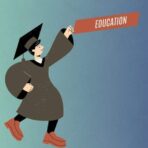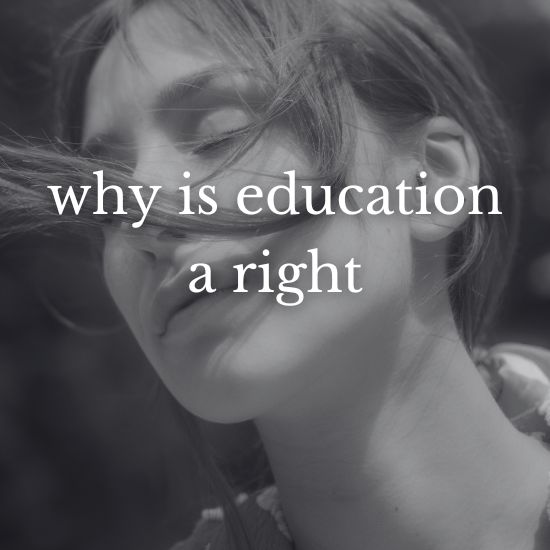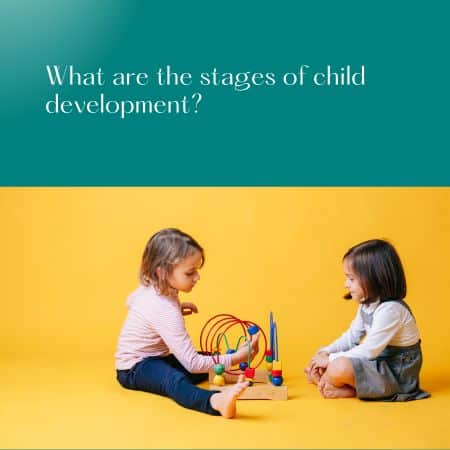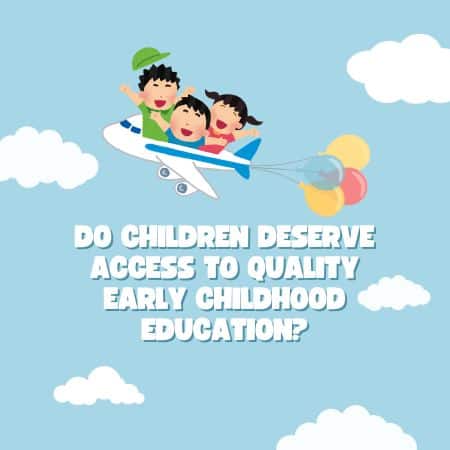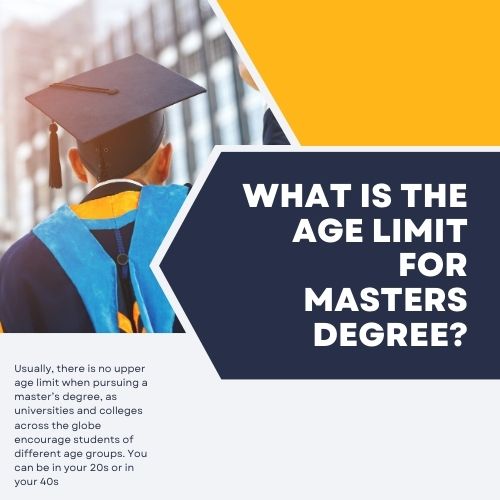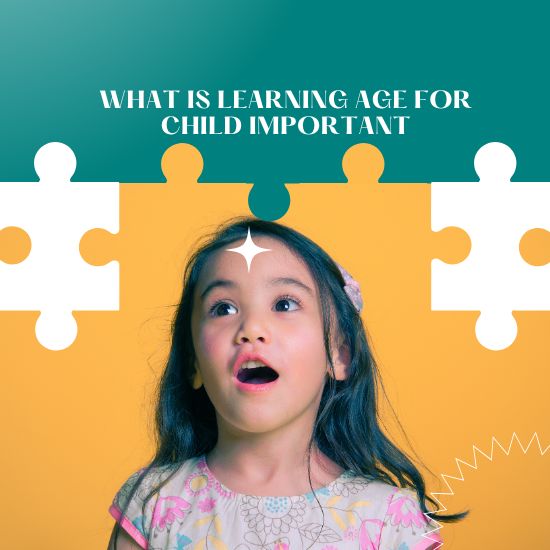Why Is Education a Right
The right to education is for everyone; it does not depend on one’s income nor on other factors. Sometimes, it is even referred to as a fundamental human right. It is essential for the advancement of both individual and society. In fact, it is enshrined in international regulations, national constitutions or calls for justice. It enables people balanced with knowledge, skills, and ethics, but at the same time able to coexist peacefully with nature and contribute to the advancement of their civilisation. In this paper, we shall analyse education as a theme, why should one view it as a basic right, what is its interconnectedness with human life and what are its defining factors that make it accessible for a few people and only in some parts of the world.
Recognition at an International Level
Every person has the right to an adequate education. This is enshrined in many treaties including Article 26 of the Universal Declaration of Human Rights enacted in 1948: “Everyone has the right to education”. There is more to education than being granted the opportunity to learn, such as essential emphasis on children’s educational needs or for Free Secondary Education (FSEE) or even expanding these provisions to other levels of schooling. This requirement is also substantiated by other important documents including the International Convention on Economic Social and Cultural Rights (ICESCR) and the United Nations Convention on The Rights of The Child (CRC), which uphold this principle.
Constitutions of Nations As it appears that there is a steady increase in the number of countries that include in their constitutions the right to education, which can be interpreted to mean that education should be made available to all the citizens of a particular nation in a fair and just manner. So in this case, the hurdle points of education aim towards the social problem where education needs to be distributed forcefully though steadily. Legal Obligations in One’s Society To view education as a basic necessity for everyone corresponds well with the ethics of fairness, respect, and social responsibility. When someone is unable to access education because of some barriers, it means that they have been stripped of the most basic means of liberation and that is a tool to fight against poverty and inequality.
Encouragement through Education. Formal education is a base of any plan for personal development. Qualities such as critical thinking, problem solving, structured communication and expression are all inherent in education. However, it is generally accepted in developed countries but where people do not tend to come out from the threshold of being outcasted, literacy and numeracy are significant as they help in earning a livelihood, seeking health care and participating in politics.
Barriers to the Right to Education: Internal Issues
The right to education is regarded as a universal right that is common to all people. Nevertheless, a large number of children all over the world do not attend school due to various barriers.
Economic Factors
Poverty
This refers to the inability to cater for school expenses, even in places where education is claimed to be free, since payments for school fees, uniforms, and other necessities must be made first.
Child Labour
Child employment in all its forms does exist and leads to children working rather than going to school.
Sociocultural Factors
Girls’ Education
There is also the view that education is at some level restricted and the most performing group is discouraged due to different norms.
Tradition
Cultural or stereotypical tendencies such as early and/or arranged marriages or certain norms for specific groups can be put in place to act as barriers to education.
Geographical Location
Rural Areas
Children and rural individuals may also be cut off from school due to the provision of poor facilities and their disadvantageous or remote location.
Conflict Zones
Conflict and natural calamities do not only cause the breaking of societies but also interfere with education and cause children to migrate with the destruction of systems.
The Failure of Governance and Policies
Inadequate Investment: Authorities in the majority of countries allocate only a small percentage of their total output to education, leading to overcrowded classrooms, unqualified teachers, and poorly equipped facilities.
Mismanagement of Resources: Such forms of educational fund abuse further intensify disparities and degrade the quality of education being offered.
The Role of Education in Relation to Achieving Sustainable Development
According to the United Nations’ Sustainable Development Goals, it is not enough for every education to merely conform to the standards of the current times; there should be considerable attempts to ensure broader and fairer distribution of education. Attaining this aim, in its own way, advances the chances of accomplishing the rest of the SDGs including the elimination of poverty (SDG 1), the elimination of discrimination and violence against women (SDG 5), and even the creation of peaceful and inclusive societies (SDG 16).
In this light, education becomes a driving force for advancement and economic progress, which subsequently generates stability. It also prepares individuals with the requisite skills for addressing relevant challenges such as climate change, pandemics, social injustice, and many more global issues.
A Call to Action
For the right to education to become a reality for everyone, there must be efforts from the government, international organisations, civil society, and individuals:
Policy Interventions
Universal Access: Authorities must abolish school fees and ensure that all children without exception can access quality schools.
Teacher Training: There is an ever-present need to provide trained dedicated teachers to facilitate learning activities.
Technology Integration: Technology can be an appealing alternative to overcome access constraints across platforms.
Community Engagement
Awareness Campaigns: Discrimination does not foster education as seen in grassroots stories where the need for education is emphasised.
Parental Support: Parents, potential educators, and such involvement will ensure a conducive learning environment within the home setting.
Global Solidarity
International Aid: Wealthy nations and organisations must assist children from low-income countries by providing finance, expertise, and other resources.
Public-Private Partnerships: It would be useful to integrate programmes from governments, NGOs, and businesses into such initiatives.
Who benefits the most from education
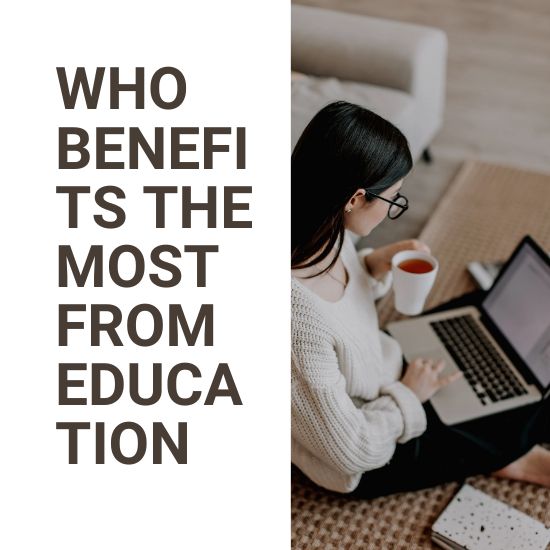
Which Group Certainly Can Be Considered The Real Winner Who Gets Most Education?
Education is, however, one of the key facilitators of human and societal progress as it empowers individuals to grasp opportunities, think critically, and achieve sustainable development. In this context, it can be stated that education is vertically expansive, where all the masses receive some form of education, but the degree of education benefits to these masses changes on an individual basis due to various personal factors, societal frameworks, and economic aspects. The emphasis now is on who the beneficiaries of the educational process are within a specific society and how this process is change-producing for different sections of society.
Aspects of Empowerment: Self Image Intervening in Education
Children and Young People
In the hierarchy of educational needs, it is children and the youth who are the primary recipients of education, as they will thus be trained for the future, which fundamentally instills the culture of education. For example, children and those of primary school age are at this stage confronted with essential educational tools such as reading, writing, and learning social skills, while the stage of adolescence begins to offer a different range of skills and education, career-focused or otherwise, as they enter the workforce.
Education Exclusions and Other Broad Factors
The most dramatic shift, however, is in the inclusion of socially excluded groups, and this is as follows:
Women and Girls: Women are subjected to systematic oppression based on socio-culture, financial deprivation, early pregnancy, and child marriages. The availability of education completely transforms a woman’s life. It allows her to secure a good job, to maintain better health, and to elevate her family’s health, which turns her into a woman of character.
Disabled Persons: Such environments help disabled individuals, and potential society contributors to develop through education, which is applied for collective integrated training. This helps dismantle such stereotypical notions.
Ethnic Minorities: Education contributes to achieving the objectives of inclusion and the integration of investment into economies and political structures that function for all inclusion, given the levels of marginalisation and systemic inequities that have engulfed ethnic minorities.
Target Groups: Adults and Lifelong Learners
People who have achieved education or attained specific skills can enhance their employment prospects as well as their income and ability to survive in an ever-dynamic economy. The importance of gaining education for life in the current economic climate is greater than ever, as economies and industries tend to evolve rapidly, often within the span of a decade.
The Strategies & Benefits of Family’s Inherited Wealth

Breaking the Cycle of Poverty
If parenting is responsible and sufficiently educated, it is possible to provide the family with a good diet, healthcare, and security. Studies have shown that children with educated parents have a considerable probability of attending school, thus creating a loop of opportunity for development.
Nurtured Decisions
Education raises the level of reasoning in parents, and in turn, enables them to make wise decisions on how their children are parented, how and where their children are raised, who cares for the children, and their plans for the children. For example, educated mothers are in a better position to ensure that their children receive immunizations, utilise family planning methods, and emphasise the need for education at home.
Society is both the Change & the Changes
Economic Growth and Innovation
Communities have an advantage over educated individuals as they can create more output, develop more businesses, and generate more creative ideas. In situations where the workforce is both sensible and resourceful, investors are more likely to invest, creating jobs and enabling the economy to thrive.
This is particularly true for the rural population, as the educational system aims to provide agricultural integration, economics, or meet local needs.
Social Cohesion
Communities have a common reference point of social integration and comprehension that is education. For they bind people of diverse groups together thus leading to fewer tensions; such institutions work to reduce conflicts.
Health and Well-Being
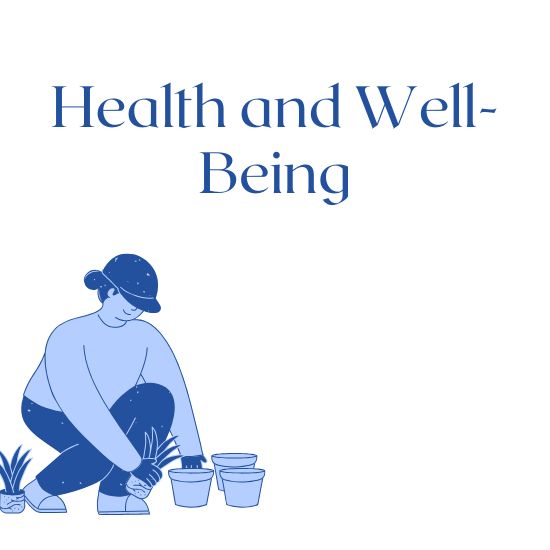
Such disadvantaged communities with education possess better health standards. They assist in the dissemination of knowledge about health, diseases, and nutrition. There are also environmental issues that concern the community, and education encourages society to manage resources wisely.
Economic Competitiveness
It is observed that nations with high literacy rates and developed educational systems tend to achieve great economic successes within a shorter time frame. A developed economy with skilled individuals fosters industrial development, stimulates innovation, and enhances competition globally. For instance, countries knowledgeable in engineering, technology, sciences, or mathematics improve their chances of being competitive and innovative.
Reduced Inequality
Inequalities of income are lessened by education in terms of providing an opportunity to rise on the social ladder. If there is access and equity in the provision of education, then every community in the nation has the ability to contribute to its development.
Democratic Procedures
The functioning of a representative democracy rests upon the shoulders of an active group of educated individuals. Education enables citizens to participate in various political activities, defend their rights and interests, and hold governments accountable. Such voters help maintain the integrity of democratic elections and combat corruption.
Conflict Prevention and Peace
Involvement in education reduces the propensity towards conflict arising from the availability of violent means or individuals who facilitate these. Non-violent methods of conflict resolution are promoted through education, which also cultivates desirable values that help mitigate radicalism.
Cosmopolitanism: Education Beyond the Classroom
Improved Global Health
Education impacts the health of a population in a broader manner. Keeping in mind that educated individuals are more likely to adopt healthier lifestyles, comprehend public health campaigns, and receive appropriate vaccinations. However, education does not only help to prevent the HIV/AIDS epidemic; it allows the entire globe to manage pandemics more effectively.
Enduring Development
What are the stages of child development?
The Stages of Child Development Child development is physical, cognitive, emotional and social growth integrating…
Do children deserve access to quality early childhood education
Shouldn’t Children Be Afforded a Chance to Access Quality Early Childhood Education? There are many…
Is there an age limit for Masters in France
French Master’s Degree Is There an Upper Age Limit? France has quickly become one of…
What is the age limit for Masters degree
Things You Should Keep in Mind: Entry Requirements: Generally, this is a compulsory requirement. Work…
what is learning age for child important
what is learning age for child important The Significance of Learning Age to Children Learning…
In this respect, education assists in the realisation of the United Nations’ Sustainable Development Goals (SDGs). Literacy enables individuals to tackle interlinked challenges like poverty, gender equality, and climate change among other factors that promote global sustainability. For example, educated farmers implement robust agricultural techniques that ensure minimal deforestation without reducing agricultural outputs.
Cultural Exchange and Global Citizenship
Education fosters respect for cultural differences and prepares individuals to be useful members of the world community. Programmes that encourage civic engagement further the international agenda around human rights, sustainable development, and peacebuilding.
Who would you say are the most disadvantaged in provision of education?
Education comes with many benefits; however, some groups and society as a whole today are still uneducated because of certain societal issues. Some of these include:
Children in War Areas: Children are unable to complete their education due to war and violence, affecting billions of children globally.
Refugees and Other Displaced Populations: Relocating to places such as refugee camps or other countries creates a host of problems such as language barriers and insufficient funds to facilitate education or legal issues, which hinders access to education.
A Collective Accountability
However, the issue of the education of the masses is not just for individuals, families, communities, or nations; it is for all. This means that there must be resource allocation and structural change by the governments, financial assistance for low-income countries by international bodies, and the local populace should promote equity. Moreover, investment in scholarships, infrastructure, and educational technology is also crucial for busi
